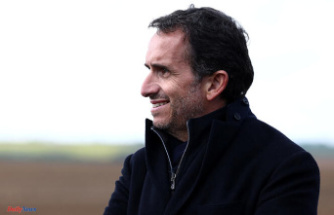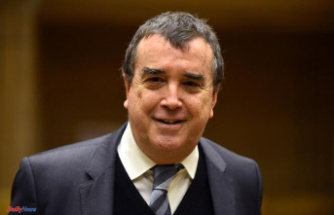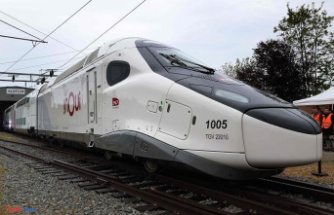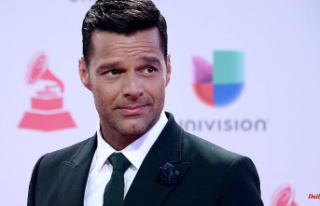At the beginning of the year, Gazprom boss Miller promised his shareholders a record dividend. But surprisingly, they forego the distribution. It is the Russian state's attempt to plug holes in the war budget at the expense of small investors.
On March 13, 2014, Gazprom boss Alexej Miller made a dramatic statement. When Russian troops occupy Crimea, a gas dispute with Ukraine ensues. If Ukraine doesn't pay soon, Gazprom could face a financing gap that could also jeopardize Europe's energy supply, Miller said after a crisis meeting in Berlin. "It also means a gap in the payment of dividends to our shareholders. That could also affect a large number of foreign shareholders. This is their income."
Foreign Gazprom investors only have to worry about their dividends for a moment. Three months later, Russia and Ukraine agree. In November 2014, the Ukrainian government paid the first tranche of its outstanding gas bills. Gazprom's funding gap is covered, gas is flowing and the dividend is being paid out as planned.
Eight years later, Russian President Vladimir Putin again used Gazprom as a weapon. After the maintenance work, gas is flowing again through Nord Stream 1 to Germany - at least a little. However, there is still a threat of an immediate stop in gas supplies. But that's not his fault or that of Gazprom, Putin explained during a visit to the Iranian capital, Tehran. Europe and the sanctions are responsible for this.
Nevertheless, unlike in 2014, Gazprom investors are suddenly without a dividend for the first time since 1998. Especially Russian, because the group is the most popular share from home. In June, the gas giant could be found in 36.5 percent of all Russian depots. 19.8 million Russians were looking forward to a high share of the profits.
Because company boss Miller proudly reported record profits for 2021 in January and promised a record payout of around $ 20 billion. This will only be collected at the last minute at the general meeting in June: "The shareholders have decided that in the current situation it does not make sense to pay dividends on the result for 2021," writes Gazprom Vice President Famil Sadygow on Telegram. Gazprom wants to use the money instead for an "investment program" - presumably for a new pipeline that leads to China via Mongolia.
But investors don't seem caught off guard by their own charity. Within a very short time, Gazprom shares have lost almost a third of their value. Small shareholders in particular are throwing them out of their portfolios. The Russian investment bank BKS commented on Gazprom's surprising withdrawal that the dividend was one of the most important factors for the attractiveness of the share.
The Russian state also finds Gazprom extremely attractive as an investment. He owns 50.3 percent of the company - quite coincidentally, the decision to cancel the profit distribution was made at the annual general meeting with pretty much exactly that share of votes. However, unlike small investors, the Russian state is not losing any money as a result. It had previously chosen Gazprom as the largest lender for unexpected expenses that arose from the "special military operation" in Ukraine.
Because although Russia earned $100 billion from oil and gas exports in the first 100 days of the war and took in almost $24 billion more than it spent in the first five months of the year, money is slowly becoming scarce. Putin has to finance his war and at the same time keep the population calm: Many people have lost their jobs and thus their secure income as a result of the sanctions and the companies that have voluntarily stopped doing business in Russia - and that with inflation at 17 percent in June.
To counteract this, the Russian government has increased pensions, minimum wages and the pay of soldiers. In April, Russian government spending was again higher than revenue. At the end of the year, the budget is expected to be at least $25 billion in deficit. And the G7 countries are still considering whether and how they can further reduce Russian income - for example by capping the price of oil.
Lots of holes that need plugging. Especially with Gazprom's income: At the end of June it became known that the company would have to pay an excess profit tax of a good 21 billion dollars. It's pretty much the amount that should actually be distributed as a dividend. The Russian state would have received the lion's share, but still only half. Without a payout, he gets the whole sum. Another coincidence?
The situation is clear for the independent Russian online medium "The Bell". The journalists speak of a particularly cynical plan that was hatched in the Kremlin. From shareholders who have been robbed. Because the excess profit tax was formulated so vaguely for a long time that it was not clear how much money Gazprom would actually have to pay from its record profits. At first, observers and investors thought that a one-time payment of seven billion dollars would be due. Only after the dividend was stopped did the Russian Ministry of Finance suddenly make it clear: Yes, seven billion dollars will be due - but in September, October and again in November.
A brazen, but still legal theft - which is even understandable from Vladimir Putin's point of view. Even the Russian president does not know how much money Gazprom will make this year and in the years to come. He can still blackmail Europe with energy supplies. But once the gas tap is turned off, Gazprom loses its biggest source of money. A development that is already mapped out, because Germany and the other EU countries are already looking for alternatives to Russian gas around the world.
At the latest when these partnerships are in place, Gazprom's income will collapse - and the Kremlin will have to look for other sources to plug the holes in its budget.












